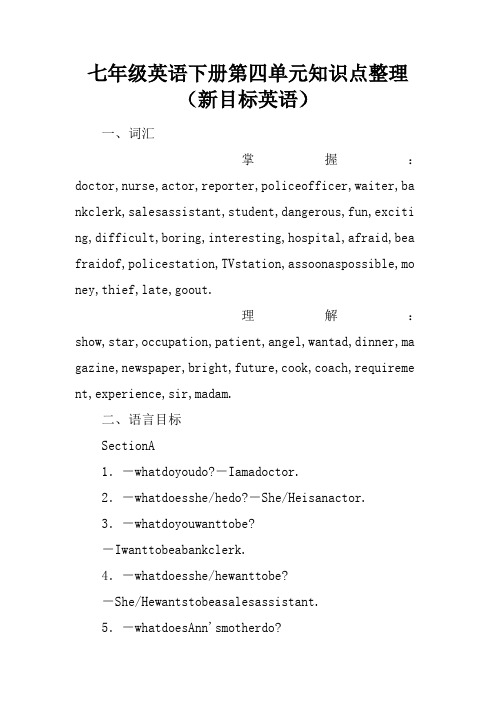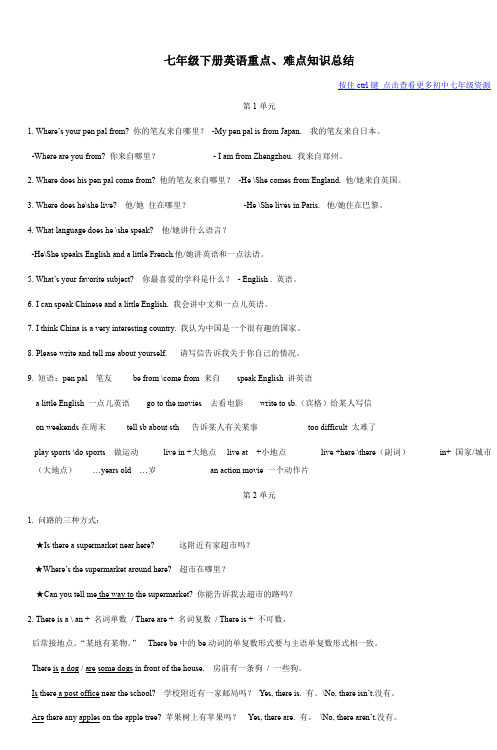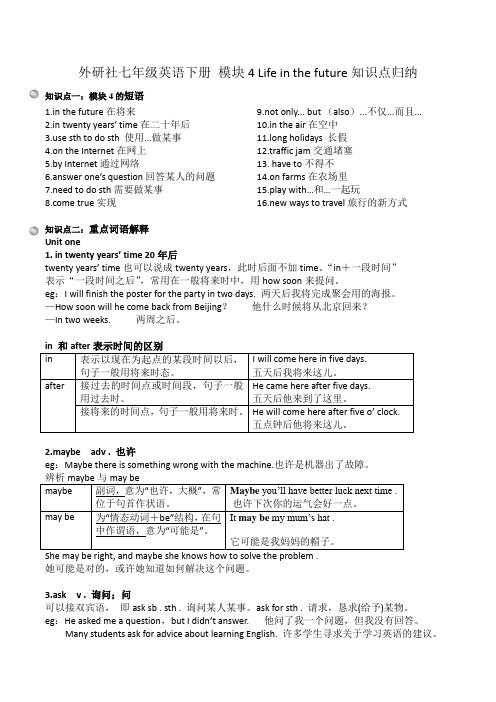七年级下册英语重点难点知识总结_4
七年级下册4单元知识点

七年级下册4单元知识点本单元主要介绍了三个方面的知识点,分别是英语语法中的过去进行时,日常生活中的健康习惯以及地理中的气候带。
一、英语语法:过去进行时过去进行时表示过去某一时间正在进行的动作或状态,通常由“was/were + 动词-ing”构成。
在句子中,过去进行时通常与另一个动作或事件发生在同一时间或多次发生的动作连用。
例如:The children were playing games when I arrived.我到达的时候孩子们正在玩游戏。
She was singing when the phone rang.电话响起时她正在唱歌。
二、日常生活:健康习惯学习健康习惯是我们每个人都应该关注的话题,它对于我们的身体健康和心理健康有着至关重要的作用。
要养成良好的健康习惯,需要注意以下几点:1.每天定时定量饮食,控制油腻食物和糖分摄入。
2.每天坚持适量运动,改善心肺功能和身体素质。
3.注意睡眠,保证每晚至少8小时睡眠时间。
4.勤洗手,保持卫生,防止交叉感染。
5.保持情绪稳定,积极乐观,避免过度压力和消极情绪。
三、地理知识:气候带地球上气候的变化主要由纬度、海洋、山脉、季风等因素共同作用引起,而这些因素也导致了不同的气候带的形成。
气候带主要分为极地带、寒带、温带和热带四种。
极地带和寒带气候寒冷干燥,温带气候温和多雨,热带气候热带潮湿。
不同的气候带也存在不同的气候类型,如海洋性气候、大陆性气候、热带雨林气候等。
了解不同的气候带和气候类型对于我们认识地球、保护环境以及规划旅行都有着重要的作用。
以上是本单元的三个主要知识点,它们分别涉及到语法、生活和地理等方面,我们需要认真学习和理解,不断提高自己的知识水平,从而更好地适应和融入这个多彩的世界。
七年级英语下册第四单元知识点整理(新目标英语)

七年级英语下册第四单元知识点整理(新目标英语)一、词汇掌握:doctor,nurse,actor,reporter,policeofficer,waiter,ba nkclerk,salesassistant,student,dangerous,fun,exciti ng,difficult,boring,interesting,hospital,afraid,bea fraidof,policestation,TVstation,assoonaspossible,mo ney,thief,late,goout.理解:show,star,occupation,patient,angel,wantad,dinner,ma gazine,newspaper,bright,future,cook,coach,requireme nt,experience,sir,madam.二、语言目标SectionA1.-whatdoyoudo?-Iamadoctor.2.-whatdoesshe/hedo?-She/Heisanactor.3.-whatdoyouwanttobe?-Iwanttobeabankclerk.4.-whatdoesshe/hewanttobe?-She/Hewantstobeasalesassistant.5.-whatdoesAnn'smotherdo?-Sheisanurse.-whatdoesshewanttobe?-Shewantstobeapoliceofficer.6.-wheredoesyoursisterwork?-Sheworksatahospital.7.myworkisinterestingbutkindofdangerous.Thievesarc afraidofme.SectionB1.Iwanttobeanactor,becauseit'saninterestingjob.2.Doyouwanttoworkhard/late?3.Heisapoliceofficer.It'sanexcitingjob.三、语言结构1.what,where引导的特殊疑问句。
七年级下册英语重点难点知识总结

七年级下册英语重点、难点知识总结按住ctrl键点击查看更多初中七年级资源第1单元1.Where’s your pen pal from?你的笔友来自哪里?-My pen pal is from Japan.我的笔友来自日本。
-Where are you from?你来自哪里?-I am from Zhengzhou.我来自郑州。
2.Where does his pen pal come from?他的笔友来自哪里?-He\She comes from England.他/她来自英国。
3.Where does he\she live?他/她住在哪里?-He\She lives in Paris.他/她住在巴黎。
4.What language does he\she speak?他/她讲什么语言?-He\She speaks English and a little French.他/她讲英语和一点法语。
5.What’s your favorite subject?你最喜爱的学科是什么?-English.英语。
6.I can speak Chinese and a little English.我会讲中文和一点儿英语。
7.I think China is a very interesting country.我认为中国是一个很有趣的国家。
8.Please write and tell me about yourself.请写信告诉我关于你自己的情况。
9.短语:pen pal笔友be from\come from来自speak English讲英语a little English一点儿英语go to the movies去看电影write to sb.(宾格)给某人写信on weekends在周末tell sb about sth告诉某人有关某事too difficult太难了play sports\do sports做运动live in+大地点live at+小地点live+here\there(副词)in+国家/城市(大地点)…years old…岁an action movie一个动作片第2单元1.问路的三种方式:★Is there a supermarket near here?这附近有家超市吗?★Where’s the supermarket around here?超市在哪里?★Can you tell me the way to the supermarket?你能告诉我去超市的路吗?2.There is a\an+名词单数/There are+名词复数/There is+不可数,后常接地点。
七下英语第四单元知识点归纳

七下英语第四单元知识点归纳English:In the fourth unit of seventh grade English, students learn about different ways to express future events, such as using will, going to, and present continuous. They also study vocabulary related to school subjects, school events, and future careers. Additionally, students learn how to make predictions using modal verbs like may, might, and could. In terms of grammar, students are introduced to the concept of countable and uncountable nouns, as well as how to use some and any correctly. They also practice using imperatives, such as giving advice or making suggestions. Lastly, students explore the theme of future aspirations and goals, discussing what they hope to achieve in the future and how they plan to make their dreams a reality.中文翻译:在七年级英语的第四单元中,学生学习了表达未来事件的不同方式,例如使用will、going to和现在进行时。
外研社七年级英语下册 模块4 Life in the future知识点归纳

外研社七年级英语下册模块4 Life in the future知识点归纳知识点一:模块4的短语1.in the future 在将来2.in twenty years’ time在二十年后e sth to do sth 使用...做某事4.on the Internet 在网上5.by Internet 通过网络6.answer one’s question 回答某人的问题7.need to do sth 需要做某事e true 实现9.not only... but (also)...不仅...而且...10.in the air 在空中11.long holidays 长假12.traffic jam 交通堵塞13. have to 不得不14.on farms 在农场里15.play with…和…一起玩16.new ways to travel 旅行的新方式知识点二:重点词语解释Unit one1. in twenty years’ time 20年后twenty years’ time也可以说成twenty years,此时后面不加time。
“in+一段时间”表示“一段时间之后”,常用在一般将来时中,用how soon来提问。
eg:I will finish the poster for the party in two days. 两天后我将完成聚会用的海报。
—How soon will he come back from Beijing?他什么时候将从北京回来?—In two weeks. 两周之后。
in 表示以现在为起点的某段时间以后,句子一般用将来时态。
I will come here in five days. 五天后我将来这儿。
after 接过去的时间点或时间段,句子一般用过去时。
He came here after five days. 五天后他来到了这里。
接将来的时间点,句子一般用将来时。
七年级下册英语第四单元知识点

七年级下册英语第四单元知识点英语是一门国际通用语言,在现代社会中扮演着举足轻重的角色。
对于初学者来说,七年级下册英语第四单元是一个非常关键的阶段。
以下是一些关于该单元知识点的讨论。
第一部分:听力技巧在七年级下册英语第四单元中,听力技巧是至关重要的一部分。
学习者需要通过听力练习来提升自己的听力能力。
这可以通过大量听英语原声音频,如听收音机、看英语电影或电视剧来实现。
此外,还需要做一些听力练习,例如听力理解题和对话填空等。
第二部分:词汇记忆词汇是学习一门语言的基础,对于初学者来说更是如此。
在七年级下册英语第四单元中,学习者需要掌握并记忆大量的词汇。
为了更好地记忆这些词汇,可以采用一些记忆技巧,例如使用词汇卡片或制作词汇表。
此外,可以利用闪卡法进行复习,将词汇分为不同的分类进行记忆。
第三部分:语法知识语法是英语学习中的重要组成部分。
在七年级下册英语第四单元中,学习者需要掌握一些基本的语法知识,例如动词的时态、名词的单复数和代词的用法等。
为了更好地掌握这些语法知识,学习者可以通过阅读英语语法教材和做相关的练习来提高自己的语法水平。
第四部分:口语表达口语表达是学习英语的重要环节。
在七年级下册英语第四单元中,学习者需要通过口语练习来提高自己的口语水平。
为了更好地练习口语,可以加入英语角或参加英语口语训练班,与其他学习者进行对话练习。
此外,还可以通过模仿英语原声音频来提升自己的口语表达能力。
第五部分:写作能力写作是英语学习中的一项重要技能。
在七年级下册英语第四单元中,学习者需要学习如何写作简单的英语文章,例如写日记、写信等。
为了提高自己的写作能力,学习者可以多做写作练习,例如写一些简单的句子或段落。
同时,还可以通过阅读英语原版书籍和写作指导书籍来提高写作技巧。
总结起来,七年级下册英语第四单元是初学者学习英语的重要阶段。
通过提升听力技巧、记忆词汇、掌握语法知识、提高口语表达和写作能力,学习者可以更好地掌握英语,进一步提高自己的语言水平。
七年级下册英语单元知识点总结道客
七年级下册英语单元知识点总结道客道客七年级下册英语单元知识点总结七年级下册英语单元知识点总结英语学习是我们初中学习的重要一环,对于初中七年级下册英语单元知识点的掌握,不仅能够帮助我们更好地理解课文,还能够提高我们的英语语言能力。
下面是对七年级下册英语单元知识点的总结,希望对同学们的学习有所帮助。
Unit 1: Greetings and Introductions这个单元主要是学习问候和介绍的表达方式。
学习如何问候他人,如何介绍自己和他人的基本信息。
同时,还学习了一些关于国家和国籍的词汇。
Unit 2: School Life这个单元主要是学习关于学校生活的表达方式。
学习如何表达自己的课程安排,学习如何询问他人的学习情况。
同时,还学习了一些学校设施和学习用品的词汇。
Unit 3: Hobbies这个单元主要是学习关于爱好的表达方式。
学习如何表达自己的爱好,学习如何询问他人的爱好。
同时,还学习了一些关于运动、音乐和艺术的词汇。
Unit 4: Family and Friends这个单元主要是学习关于家庭和朋友的表达方式。
学习如何介绍自己的家庭和朋友,学习如何询问他人的家庭和朋友。
同时,还学习了一些家庭成员和人际关系的词汇。
Unit 5: Food and Drinks这个单元主要是学习关于食物和饮料的表达方式。
学习如何点餐和询问他人的饮食习惯。
同时,还学习了一些关于食物和饮料的词汇。
Unit 6: Health and Body这个单元主要是学习关于健康和身体的表达方式。
学习如何描述自己和他人的健康状况,学习如何询问他人的健康状况。
同时,还学习了一些关于身体部位和常见疾病的词汇。
Unit 7: Clothes and Weather这个单元主要是学习关于服装和天气的表达方式。
学习如何描述自己和他人的服装,学习如何询问他人的服装和天气情况。
同时,还学习了一些关于服装和天气的词汇。
Unit 8: Shopping这个单元主要是学习关于购物的表达方式。
(完整版)人教版英语七年级下册第四单元短语语法知识点总结及练习
(完整版)人教版英语七年级下册第四单元短语语法知识点总结及练习Unit 4Don’t eat in class【短语归纳】1.on time 准时,按时2. listen to …听……3. in class 在课上4. be late for 做……迟到5. have to 不得不6. be quiet安静7. go out外出8. do the dishes 清洗餐具9. make breakfast 做早饭10. make (one’s) bed 铺床11. be noisy 吵闹12. keep one’s hair short 留短发13. play with sb. 和某人一起玩14. play the piano 弹钢琴15. have fun 玩得高兴16. make rules 制订规则【用法集萃】1.Don’t + 动词原形+其他,不要做某事。
2.help sb. (to) do sth. 帮助某人做某事3.too many + 可数名词复数太多的……4.practice doing sth. 练习做某事5. be strict with sb. 对某人要求严格6. be strict in sth. 对某事要要求严格7. leave sth sp. 把某物忘在某地8. keep + 宾语+形容词使……保持某种状态9. learn to do sth. 学会做某事10. have to do sth. 不得不做某事┃语法探究┃┃.祈使句定义:用于表达命令、请求、劝告、警告、禁止等的句子叫__________句。
时态:使用______________时态。
结构:动词原形+其他成分+please. 否定祈使句在动词原形前面加__________ 。
如:Be quiet in the classroom, please.在教室里请保持安静。
Don't fight. 不要打架┃.情态动词have to 和must1.情态动词have to和must都表示“__________”的意思。
[全]译林版七年级英语下册Unit4重点知识与语法总结
译林版七年级英语下册Unit4重点知识与语法总结Unit 4 Finding your way一、重点词组、句型1. Are you sure, Hobo?be sure of sth. 对……确信(有把握)be sure to do sth. 一定要去做某事be sure +that从句I am sure of my answers.我对我的答案有把握。
They are sure to win the game.他们一定会赢得比赛。
I am sure that they will win the game.2.I think we have to go up again.have(had/has) to意为“不得不",强调客观,愿意也要做,不愿意也要做(否定式don’t have to)must强调主观,自己认为必须要去做, 但mustn’t 意为“禁止,不准”,语气强烈。
Dad, must I finish my homework before going shopping?爸爸,我必须要在购物之前完成作业吗?肯定回答:Yes, you must./ I’m afraid you have to.否定回答:No, you don’t have to./ No, you needn’t.My bike is broken,so I walk to school.3.Sunshine Zoo is north of Sunshine Middle School.表示“A在B的东/南/西/北面”用句型:”A is east/south/west/north of B”其同义句是:A is to/on the east/south/west/north of B。
eg.Nanjing is west of Shanghai=Nanjing is to the west of Shanghai.表示方位的介词in, on与to 的区别(1)in表示A在B的范围之内Taiwan is the south of China.(2) to表示两者不接壤,不从属Hangzhou is the south of Taizhou.(3)on表示两地接壤China is on the south of Russia.4. Remember that they are dangerous. Never go near them.记住他们很危险,不要靠近他们①remember sth. 记得/记住某物Can you remember your ID card numbers?②remember to do sth.记得去做某事(未做)Please remember to turn off the lights when you leave.③remember doing sth.记得做过某事(已经做了)I remember turning off the lights, but it’s on now.④remember +that从句反义词:forget(过去式forgot)用法相同eg. Please remember (turn) off the light when you leave the classroom.I remember (meet) the man somewhere.5.Go straight on,and you’ll find the Panda House.“祈使句+and/or +一般将来时"表示在假设的某种条件下将会产生的结果,and通常后接好的结果,or意为“否则”,通常后接不好的结果。
人教版七年级下册英语Unit 4 知识点语法归纳总结
Unit 4 Don’t eat in class.1.短语归纳2.典句必背3.用法集萃(1)Don’t arrive late for class. 不要上课迟到❖arrive in❖arrive at(2)You must be on time. 你必须准时。
❖on time是固定搭配,意为“按时;准时”。
例:Don’t worry. The train will arrive on time. 别担心。
火车会准时到达的。
❖常见的time短语(3)Don’t listen to music in class. 不要上课时听音乐牛刀小试—Do you like the songs by Taylor?一Yes. Country music ______ nice and full of feelings.A. SoundsB.listensC. hearsD. looks(4)This is very important. 这是很重要的❖important作形容词,意为“重要的”。
如:The first lesson is very important. 第一课是很重要的❖反义词:unimportant adj. 不重要的❖派生词:importance n. 重要;重要性(5)Can we bring music players to school? 我们可以把音乐播放器带到学校里来吗?❖bring作动词,意为“带来;拿来”例:Don’t forget to bring your homework here. 不要忘记把你的家庭作业带过来❖辨析bring, take, carry和get牛刀小试Don’t forget _____ your photos here when you come to school.A.bringingB. to takeC. takingD. to bring(6)Oh, and we also have to be quiet in the library. 哦,我们在图书馆里还必须保持安静❖quiet作形容词,意为“安静的”,可以用来修饰人,也可以用来形容地点或场所等。
- 1、下载文档前请自行甄别文档内容的完整性,平台不提供额外的编辑、内容补充、找答案等附加服务。
- 2、"仅部分预览"的文档,不可在线预览部分如存在完整性等问题,可反馈申请退款(可完整预览的文档不适用该条件!)。
- 3、如文档侵犯您的权益,请联系客服反馈,我们会尽快为您处理(人工客服工作时间:9:00-18:30)。
七年级下册英语重点、难点知识总结按住ctrl键点击查看更多初中七年级资源第1单元1. Where’s your pen pal from? 你的笔友来自哪里?-My pen pal is from Japan. 我的笔友来自日本。
-Where are you from? 你来自哪里?- I am from Zhengzhou. 我来自郑州。
2. Where does his pen pal come from? 他的笔友来自哪里?-He \She comes from England. 他/她来自英国。
3. Where does he\she live? 他/她住在哪里?-He \She lives in Paris. 他/她住在巴黎。
4. What language does he \she speak? 他/她讲什么语言?-He\She speaks English and a little French.他/她讲英语和一点法语。
5. What’s your favorite subject? 你最喜爱的学科是什么?- English . 英语。
6. I can speak Chinese and a little English. 我会讲中文和一点儿英语。
7. I think China is a very interesting country. 我认为中国是一个很有趣的国家。
8. Please write and tell me about yourself. 请写信告诉我关于你自己的情况。
9. 短语:pen pal 笔友be from \come from 来自speak English 讲英语a little English 一点儿英语go to the movies 去看电影write to sb.(宾格)给某人写信on weekends在周末tell sb about sth 告诉某人有关某事too difficult 太难了play sports \do sports 做运动live in +大地点live at +小地点live +here \there(副词)in+ 国家/城市(大地点)…years old …岁an action movie 一个动作片第2单元1. 问路的三种方式:★Is there a supermarket near here? 这附近有家超市吗?★Where’s the supermarket around here? 超市在哪里?★Can you tell me the way to the supermarket? 你能告诉我去超市的路吗?2. There is a \ an + 名词单数/ There are + 名词复数/ There is + 不可数,后常接地点。
“某地有某物。
”There be中的be动词的单复数形式要与主语单复数形式相一致。
There is a dog / are some dogs in front of the house. 房前有一条狗/ 一些狗。
Is there a post office near the school? 学校附近有一家邮局吗?Yes, there is. 有。
\No, there isn’t.没有。
Are there any apples on the apple tree? 苹果树上有苹果吗?Yes, there are. 有。
\No, there aren’t.没有。
3. 本单元介词:in 在…里on 在…上面near 在…附近next to紧挨着between …and …在…中间behind 在…后面across from 在…对面in front of…在…(外部的)前面in the front of…在…(内部)的前面4. 其它短语:post office 邮局pay phone 公用电话on the right / left 在右边/ 左边turn left / right 向左/ 右拐go straight 一直向前走the beginning of……的开始take a walk =have a walk 散步have fun 玩得开心take a taxi 乘出租车play the violin 拉小提琴in the neighborhood 在附近 a quiet street 一条安静的街道 a busy street 一条繁忙的街道be hungry 饿了 a small house with an interesting garden 一个带有一个有趣的花园的小房子let sb. v. sth.让某人做某事(let加动词原形)go through 穿过去on your right 在你的右边a good place to have fun 一个可以玩得开心的好地方have a good trip 旅途愉快Excuse me.打扰了。
第3单元:1. 你为何想看狮子?Why do you want to see the lions?2. 你为什么喜欢考拉?Why do you like koalas?3. 你喜欢什么动物?What animals do you like?4. 有几分kind of a box of……一箱……play with…和……一块儿玩起来get upduring the day在白天期间at night在夜里every day每天(放在句首或句尾作时间状语)5. 频率词never(从不)<sometimes(有时)<often(经常)<usually(通常)< always(总是)放在be后:She is often angry.她经常生气。
I am always friendly to others. 我总是对他人友好。
放在实义动词前:He sometimes gets up late. 他有时起床晚She usually goes to bed at 9:00.第4单元1. What do you do? 你是干什么的?What does she / he do? 她/ 他是干什么的?I’m a waiter. 我是一个侍者。
She / He is a doctor. 她/ 他是一个医生。
2. What do you want to be? 你想当什么?I want to be an actor. 我想当演员。
What does he / she want to be? 他/ 她想当什么?He / She wants to be a reporter. 他/ 她想当记者。
3. give用法give sb sth(双宾结构)=give sth to sb. 把某物给某人Please give me a box of oranges. 请给我一箱苹果。
=Please give a box of oranges to me.若物是代词,不用于双宾结构。
You can’t give it to him.不可说成You can’t give him it.4. get sth from sb. 从某人处得到某物:We can get money from the bank.我们能从银行得到钱。
You can’t get anything from me.你不能从我这儿得到任何东西。
5. in the day在白天=in the daytime6.talk用法:“谈话”,名词和动词,have a talk 谈话=talk, 前者中talk是名词,后者中talk是动词。
Don’t talk in class.不要在班里说话。
talk with sb.和某人交谈talk to sb.找某人谈话talk about sth.谈论某事例:I want to talk to you.我想找你谈谈。
She is talking with her son.她正和儿子谈话。
She is talking about her family / her son’s study / Tom.她在谈论她的家庭/ 她的儿子的学习情况/ 有关Tom 的情况。
7. out用法:当副词,后无宾语时无ofMay I go out now?我现在可以出去了吗?She is out. 她在外面。
但接宾语时先加of:She can’t go out of the park.她不能走出这个公园。
He is out of the office.他在办公室外。
8. ask用法(P21, 3a)ask可以译为“请”:He asks me to go with him.他请我和他一块儿去。
也可译为“问”,常接双宾结构:May I ask you some questions?我可以问你一些问题吗?ask (sb) for……“要……”,后接物。
Can I ask (you) for some meat? 我可以(向你)要些肉吗?9. work hard努力工作(work是动词,hard是副词)She works very hard.她工作很努力。
Please work hard at English.请努力学英语。
hard work艰苦的工作(hard是形容词,work是名词)Teaching English is hard work. 教英语是艰苦的工作。
10. as作为:He works as a farmer.他(的职业)是个农民。
(work as后接职业)We want a man as a shop assistant. 我们需一个当店员的男子。
She got a job as a waiter.她得了份招待员的工作。
11. Call Alan at 555-3937 按照555-3937给Alan打电话。
12. work for 为……工作(后接对象)Wen Jiabao works for the people.温家宝为人民而工作。
Yao Ming works for Rockets.姚明为火箭队工作。
13. want sth想要某物:I want some eggs.我想要些鸡蛋want to do sth想要做某事:I want to have a look at it. 我想看看它。
want sb to do sth.想让某人做某事:She wants me to help her. 她想让我帮她。
第5单元:1. What’s he doing? 他正在做什么?He is reading. 他在读书。
